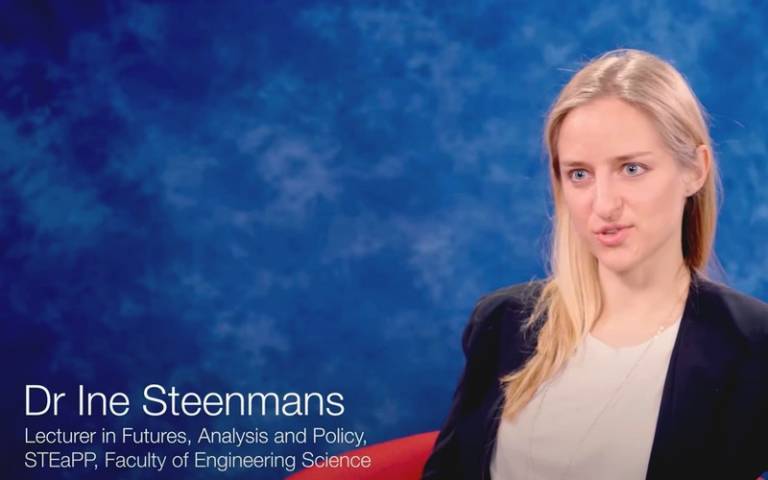UCL helps deliver an innovative Monitoring and Evaluation (M&E) Training Programme for BEIS
UCL’s STEaPP team has trained over 200 staff from the Department for Business, Energy and Industrial Strategy (BEIS) in monitoring and evaluation methods.

10 November 2023
Formed in July 2016, the Department for Business, Energy and Industrial Strategy (BEIS) brought together the former departments for Business, Innovation and Skills and Energy and Climate Change.
BEIS had a variety of responsibilities from business, industrial strategy, science, research and innovation to deregulation, energy and clean growth and climate change. But the department also spent part of the UK’s overseas aid budget on research and innovation supporting economic development, social welfare and long-term sustainable and equitable growth in low and middle-income countries.
A need for improved evaluation and analytical capability
Senior management within BEIS identified an opportunity for the department to contribute to the government’s better evaluation agenda by investing internally in its staff’s M&E competencies. The initiative focused on providing analysts from across diverse professions and directorates with access to training in how to use diverse evaluation methods and approaches across a wide range of policy contexts and tasks.
That’s when they engaged UCL Consultants (UCLC), the university’s gateway between UCL academics and the external world, and a part of UCL Innovation & Enterprise.
With UCLC providing commercial, contractual and project management services, the BEIS team was able to access the university’s Department of Science, Technology, Engineering and Public Policy (STEaPP); a uniquely policy-oriented department within UCL’s Engineering Sciences faculty.
Working in a three-way collaboration
All of STEaPP’s education, research and policy expertise and activities have one aim: to change the world for the better. Founded in the recognition that science, technology and engineering expertise are vital to tackling today’s most pressing global challenges - from energy access to climate change and congested cities - STEaPP’s experts know that for the most impactful results, public policy needs to be informed by different kinds of expertise and evidence. Collaborative policy making is at the heart of all they do.
Dr Ine Steenmans, Associate Professor in Futures, Analysis and Policy at STEaPP, UCL, headed up the project, working closely with the Central Analysis team at BEIS.
UCL also partnered with Technopolis, a policy consulting firm with 30 years of experience in the global evaluation of science, technology and innovation policy, to design and deliver the training programme, bringing practical expertise in the research design for evaluation of public interventions. Cristina Rosemberg, Director at Technopolis UK played a key role in the collaboration, designing and delivering this bespoke short course.
Delivered in two parts of three modules to over 200 participants
The programme curriculum and structured covered three modules: M&E Fundamentals, Theory-based M&E approaches, and Experimental M&E approaches.
Each module structure was made of two parts. First, a learning component of 3 asynchronous hours on an online learning platform, including approximately 6 videos of 10 minutes duration per module. The second part comprised a half-day workshop for each module with trainer-led group discussions and activities. All but the last cohort were delivered online.
In just over a year, more than 200+ participants have successfully completed the training programme. Since, then participants have gone to occupy positions in three different government departments, including the Department of Science, Innovation and Technology (DSIT), the Department of Energy and Net Zero (DESNZ), and the Department of Business and Trade (DBT) (after the dissolution of BEIS).
Training policy leaders of the future
Dr Ine Steenmans of STEaPP commented, ‘It is incredibly rewarding to collaborate on such high quality capability development projects with partners in government. At STEaPP, we spend a lot of time reflecting on what works, for whom and in what way when we design training programmes for policy leaders of the future. BEIS’ commitment to the quality of learning available for their staff enabled us to suggest and incorporate some of the latest teaching practices - and deliver this bespoke mixed mode learning experience for a very diverse group of policy analysts.’
Cristina Rosemberg at Technopolis added “it has been unique experience to be able to bridge academic knowledge with the expertise from practitioners, to provide BEIS with strong insights on how best to assess ‘what works’ in policy interventions, demystify technical concepts and hopefully empowered BEIS to be leaders in the use of evidence for better policy making”
A member of the BEIS Central Evaluation team added, ‘The department is proud to invest in Monitoring and Evaluation, and believes this investment informs key decision making and improves outcomes. From the very beginning, the training has enabled staff to gain a firm understanding of Monitoring and Evaluation and how this is applied. The underlying success of this is due to the adaptability from UCL and UCLC to make changes to the training where necessary and the engaging module conveyors leading this. This is vital to ensuring colleges are engaged and equipped with the knowledge and skills necessary, to guarantee best practice M&E is undertaken within the department.’
--
BEIS existed until March 2023 when it was split to form the Department for Business and Trade (DBT), the Department for Energy Security and Net Zero (DESNZ) and the Department for Science, Innovation and Technology (DSIT).
 Close
Close



